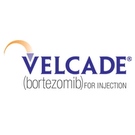Articles tagged with: Velcade
News»

In a recent Phase 3 trial, a Velcade (bortezomib) and dexamethasone (Decadron) combination resulted in the longest progression-free survival in multiple myeloma patients, including those at high risk. The study will be presented at the upcoming American Society of Hematology (ASH) meeting in New Orleans on Monday, December 7, 2009.
The trial compared the Velcade-dexamethasone combination (VD) with a vincristine, doxorubicin (Adriamycin), and dexamethasone combination (VAD). As induction therapies, VD and VAD reduce the number of cancer cells in the body before a patient undergoes high-dose chemotherapy and autologous …
News»

Preliminary results from several clinical trials testing carfilzomib (Kyprolis) for the treatment of multiple myeloma will be presented at the 51st American Society of Hematology (ASH) Annual Meeting and Exposition in New Orleans December 5 through 8.
Carfilzomib, a proteasome inhibitor, is under development as a treatment for relapsed or refractory multiple myeloma. It is currently in Phase 2 of clinical testing, which means that its safety and efficacy are being studied.
The ASH presenters will examine the effects of carfilzomib in patients who have previously been treated with Velcade (bortezomib); …
News»

Results from a new study indicate that, in elderly multiple myeloma patients, a combination drug regimen of Velcade (bortezomib), melphalan (Alkeran), prednisone, and thalidomide (Thalomid) (VMPT), followed by a maintenance regimen of Velcade and thalidomide, is superior to the current standard treatment of Velcade, melphalan, and prednisone (VMP) without a maintenance regimen. The authors of the study will be presenting the results of the Phase 3 clinical trial at the upcoming American Society of Hematology (ASH) Annual Meeting and Exposition.
In the study, scientists randomly assigned 511 myeloma …
News»

Preliminary results from an ongoing Phase 2 trial show that a combination therapy of Velcade (bortezomib) and Torisel (temsirolimus) is highly effective in reducing blood and urine levels of abnormal monoclonal protein (known as “M” protein) in multiple myeloma patients. The preliminary study results will be presented at the American Society of Hematology’s (ASH) 51st annual meeting in New Orleans on Monday, December 7.
Myeloma cells produce M proteins. Higher levels of M proteins are directly related to increased disease progression and severity.
Torisel, a drug already approved for use in …
News»

A new study suggests that Velcade (bortezomib), in combination with other drugs, is a better treatment method for patients with newly diagnosed multiple myeloma than the previous standard drugs.
The study, titled “Velcade, Intravenous Cyclophosphamide, and Dexamethasone (VCD) Induction for Previously Untreated Multiple Myeloma (German DSMM XIa Trial),” will be presented on December 6 at the American Society of Hematology (ASH) Meeting in New Orleans.
The researchers compared a drug cocktail consisting of Velcade, cyclophosphamide (Cytoxan), and dexamethasone (Decadron) with the previous standard cocktail of vincristine, doxorubicin …
News»

Elderly people with multiple myeloma have better treatment options now than ten years ago. In the past decade, the introduction of thalidomide (Thalomid), Velcade (bortezomib), and Revlimid (lenalidomide) have improved patients’ response to treatment and increased survival time, even when used without stem cell transplants.
In the July issue of Current Opinion in Hematology, Dr. Donna E. Reece, a physician and researcher at the Princess Margaret Hospital in Toronto, reviewed the current approaches to treating newly diagnosed multiple myeloma patients. Dr. Reece discussed autologous and allogeneic stem cell transplants …
News»

Vitamin C (ascorbic acid) significantly reduces the activity of Velcade (bortezomib) in treatment of multiple myeloma, according to a recent article published in Nature.
Several preclinical studies suggest that vitamin C, which is one of the most common dietary supplements for cancer patients, increases the efficacy of cancer drugs and decreases treatment-related side effects. However, more recent studies show that vitamin C can counteract the activity of certain cancer chemotherapy agents, including Velcade, in the body.
Velcade, the first proteasome inhibitor approved for the treatment of multiple myeloma, blocks the activity …

